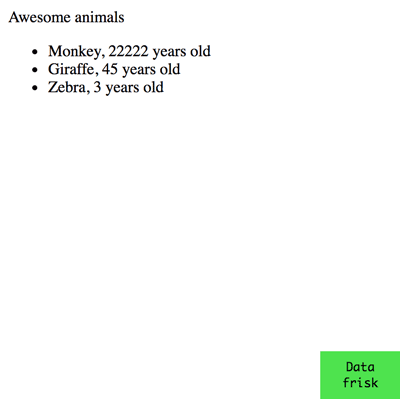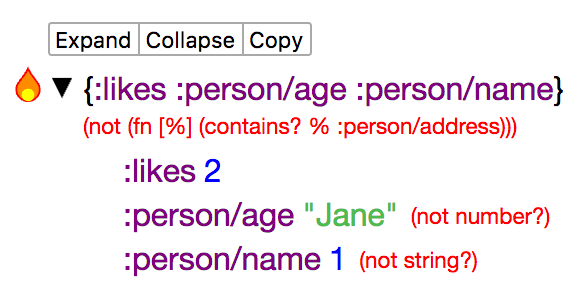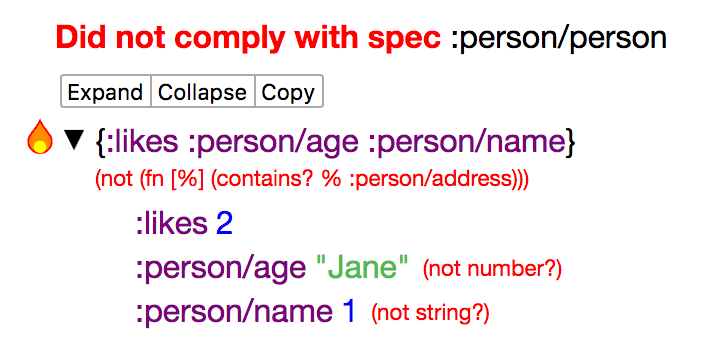"Get your facts first, then you can distort them as you please" - Mark Twain
Visualize your data in your Rum apps as a tree structure.
Suitable for use during development.
Add data-frisk-rum to the dev :dependencies in your project.clj
This library's public API consists of two rum components: datafrisk.core/DataFriskShell and datafrisk.core/DataFriskView.
This is what you see in the animation above. The component renders as a single data navigation "shell" fixed to the bottom of the window. It can be expanded/hidden via a toggle at the bottom right hand corner of the screen.
Example:
(ns datafrisk.demo
(:require [rum.core :as rum]
[datafrisk.core :as d]))
(defn mount-root []
(rum/mount
(d/DataFriskShell
;; List of arguments you want to visualize
{:data {:some-string "a"
:vector-with-map [1 2 3 3 {:a "a" :b "b"}]
:a-set #{1 2 3}
:a-map {:x "x" :y "y" :z [1 2 3 4]}
:a-list '(1 2 3)
:a-seq (seq [1 2])
:an-object (clj->js {:a "a"})
:this-is-a-very-long-keyword :g}}
{:a :b :c :d})
(js/document.getElementById "app")))This component lets you dig in to any data structure. Here's an example of its use:
(ns datafrisk.demo
(:require [rum :as rum]
[datafrisk.core :as d]))
(def app-state {:animals [{:species "Giraffe" :age 10}
{:species "Rhino" :age 4}
{:species "Monkey" :age 4}]})
(rum/defc AnimalSalute [animal]
[:div
(str "Hi " (:species animal) "!")
(d/DataFriskView animal)])
(defn mount-root []
(rum/mount
[:div
(for [animal (:animals app-state)]
(AnimalSalute animal))]
(js/document.getElementById "app")))This component shows spec error messages in a human friendly way.
(s/def :person/name string?)
(s/def :person/age number?)
(s/def :person/address string?)
(s/def :person/person (s/keys :req [:person/name
:person/age
:person/address]))
(s/def :app/persons (s/coll-of :person/person))
;; Render
(SpecView
{:errors (s/explain-data :person/person {:likes 2
:person/name 1
:person/age "Jane"})})This is a convenience component that adds a title above the SpecView.
(SpecTitleView
{:errors (s/explain-data :person/person {:likes 2
:person/name 1
:person/age "Jane"})})You can also override the title.
(SpecTitleView
{:title {:style {:font-weight "700" :color "red"}
:text "What ever you want"}
:errors (s/explain-data :person/person {:likes 2
:person/name 1
:person/age "Jane"})})
Here is an example of how you can render spec errors that are thrown when spec instrumentation finds an error.
;; Instrumentation is enabled
(cljs.spec.test.alpha/instrument)
(def state (atom {}))
(try
(do-stuff)
(catch js/Error e
;; Hack to get the name of the fdef'ed var from message, see why https://dev.clojure.org/jira/browse/CLJ-2166
(when (:cljs.spec.alpha/problems (ex-data e))
(swap! state assoc :current-error {:errors (ex-data e)
:title {:text (second (re-find #"Call\sto\s#'(.*)\sdid"
(aget e "message")))}}))
nil))
;;;; In your render code
(rum/defc My-exception-view-comp [state]
(SpecTitleView (:current-error state)))
See the dev/demo.cljs namespace for example use. There are also devcards that you can look at.
To see devcards use next figwheel commands:
lein figwheel
# after figwheel starts:
(start-autobuild cards)To run tests you should install several node packages:
npm install
npm install -g karma-cliThen you may run tests with:
lein testing


